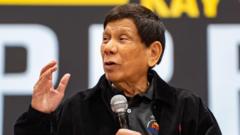Could Rodrigo Duterte Face Crimes Against Humanity Charges?

Published: 2025-09-22 20:20:21 | Category: world
Rodrigo Duterte, the former president of the Philippines, has been charged with crimes against humanity by the International Criminal Court (ICC) for his role in a brutal anti-drug campaign resulting in thousands of deaths. These charges highlight serious allegations of extrajudicial killings that occurred under his administration, raising critical questions about accountability and justice for the victims of his policies.
Last updated: 10 October 2023 (BST)
Key Takeaways
- Rodrigo Duterte faces charges of crimes against humanity related to extrajudicial killings.
- The ICC's charges cite specific incidents and a broader campaign against alleged drug offenders.
- Duterte is currently in custody in The Hague and has health issues that complicate his ability to stand trial.
- His administration's drug war reportedly resulted in over 6,000 deaths, with estimates suggesting the actual number may be much higher.
- The ICC's efforts may be hindered by the Philippine government's lack of cooperation.
The Charges Against Duterte
The ICC's charge sheet, made public recently, details allegations that Duterte was criminally responsible for multiple murders linked to his notorious war on drugs. Prosecutors claim he acted as an “indirect co-perpetrator” by enabling the killings conducted by police and other individuals. The charges are divided into specific incidents and broader patterns of violence.
Specific Allegations
According to the ICC, the first count against Duterte involves the killings of 19 individuals in Davao City, which occurred during his tenure as mayor from 2013 to 2016. The subsequent charges relate to his presidency (2016-2022) and include:
- The murder of 14 identified "high-value targets" across the Philippines.
- The murder and attempted murder of 45 people during village clearance operations.
These incidents reflect a systemic approach to combating drug-related crime through extreme measures, including extrajudicial killings.
The Impact of Duterte's Drug War
Duterte's anti-drug campaign has been widely condemned for its brutality, with estimates of the death toll ranging from 6,000 to potentially tens of thousands. Human rights organisations have accused the administration of violating fundamental rights, arguing that many victims were extrajudicially executed without due process.
The former president has maintained that his actions were necessary to restore order and eliminate drug-related crimes, framing the campaign as a public safety initiative. However, the ICC's investigation seeks to challenge this narrative by focusing on the implications of his leadership and the violent outcomes of his policies.
Global Context and Accountability
The indictment of Duterte marks a significant moment in international law, as he becomes the first Asian former head of state to face such charges from the ICC. This case could set a precedent for how similar situations are handled in the future. The ICC relies on member states for cooperation in enforcement, which poses challenges, particularly when the current Philippine administration, led by President Ferdinand Marcos Jr., has previously indicated a reluctance to work with the ICC.
Legal and Political Ramifications
As the ICC moves forward with its case, questions arise regarding the political motivations behind the charges. Duterte's supporters have alleged that the ICC is being utilised as a political weapon against him, particularly amid tensions between the current government and the Duterte family. The political landscape in the Philippines remains volatile, with the implications of these charges potentially affecting future governance.
Duterte's Current Status
Rodrigo Duterte, now 80 years old, has been in custody in The Hague since March 2023. His legal team asserts that he is too ill to stand trial, a claim that adds another layer of complexity to the proceedings. Despite his imprisonment, Duterte was recently re-elected as mayor of Davao, with his son, Sebastian Duterte, continuing his duties in the role.
What Happens Next?
The ICC's case against Duterte will likely unfold over the coming months or years, depending on various factors, including his health and the political climate in the Philippines. The court's ability to secure cooperation from the Philippine government may significantly influence the case's outcome.
As the ICC continues its investigation, the world watches closely to see how this unprecedented situation will develop. The allegations against Duterte raise crucial questions about accountability, governance, and the future of human rights in the Philippines.
FAQs
What are the main charges against Rodrigo Duterte?
Rodrigo Duterte faces charges of crimes against humanity, including involvement in extrajudicial killings during his anti-drug campaign, particularly targeting alleged drug offenders.
How many people died during Duterte's war on drugs?
Official estimates suggest over 6,000 people were killed during Duterte's drug war, though human rights groups claim the actual number could be significantly higher, potentially in the tens of thousands.
What is the ICC's role in prosecuting Duterte?
The International Criminal Court (ICC) investigates and prosecutes individuals for crimes against humanity, war crimes, and genocide. In Duterte's case, the ICC is examining his role in systemic extrajudicial killings.
Is the Philippine government cooperating with the ICC?
Currently, the Philippine government, under President Ferdinand Marcos Jr., has indicated a lack of cooperation with the ICC, complicating the court's ability to enforce its charges against Duterte.
What are the implications of Duterte's indictment?
Duterte's indictment by the ICC could set a precedent for international accountability regarding human rights abuses, particularly concerning former heads of state and their conduct during their terms in office.



